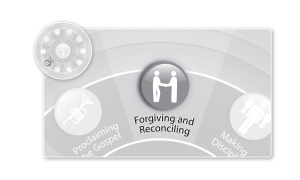It sounds like an ominous topic, doesn’t it? Something we should hope we never face. Something that we’re fortunate that Jesus saves us from.
But wait a minute—it’s not the judgment of God that Christians should fear. It’s the wrath of God. And it turns out that the wrath of God is what we face when we run from the judgment of God.
The judgment of God is something that all flesh should welcome—and long for!
Remember in the Old Testament book of Judges: Judges are those raised up by God to free the Israelites from bondage—bondage that they blundered into of their own accord.
God’s righteousness works the same way. It’s first and foremost God’s way of setting the world—and all of us within it–right. So far from being something we run away from, it’s something we should run toward. And that’s what our new blog series this month on the Work of Mercy of forgiving and reconciling is all about.
The judgment of God is joined at the hip to God’s forgiveness of us–and it’s the wellspring of our forgiveness of others. That’s why our foundational Scripture in this series is found in 1 Timothy 1:15-17, where Paul talks about the judgment of God and why we should welcome it and never run from it.
This is how Paul starts, in 1 Timothy 1:15:
Here is a trustworthy saying that deserves full acceptance: Christ Jesus came into the world to save sinners—of whom I am the worst.
Christ Jesus came into the world to save sinners. That’s his judgment, his righteousness—his setting things right. The foundation of his forgiveness.
When we read 1 Timothy 1:15 it’s hard to overlook Paul’s comment in that verse about himself—the part where he says that he is the worst of sinners. It sounds like an exaggeration, doesn’t it?
But it’s actually not–and it’s actually key to understanding everything we’re talking about here about why the judgment of God is a major league part of God’s good news for us.
Paul persecuted Christians—which is to say, he persecuted Christ’s own body—which is to say, he persecuted Christ. Remember, Christ says to him on the Damascus Road, “Saul, Saul, why do you persecute me?”
Paul persecuted Christ himself. That makes him quite reasonably the worst of sinners. And yet one of the most important things for us to see about this passage of Scripture is how readily Paul accepts this truth—God’s judgment—about himself. Paul doesn’t deny this truth, justify it, downplay it, explain it, glorify it, or attempt to change the subject. He simply states it. He just accepts it. Totally.
And then Paul goes on to point out that because of Christ Jesus, Paul’s acceptance of the judgment of God has opened the door to God’s mercy to Paul—and God’s transformation of Paul—in Christ Jesus. Check out 1 Timothy 1:16-17:
But for that very reason [Christ coming into the world to save the worst of sinners] I was shown mercy so that in me, the worst of sinners, Christ Jesus might display his unlimited patience as an example for those who would believe on him and receive eternal life. Now to the King eternal, immortal, invisible, the only God, be honor and glory for ever and ever. Amen (1 Timothy 1:16–17).
What you see here in Paul—our acceptance of God’s judgment leads to God’s mercy in Christ Jesus—is the very essence of what Christians call justification by faith. And this is why we welcome and plead for God’s judgment—because in Christ, God’s mercy follows God’s judgment for all who put their trust in Christ Jesus.
That’s God’s forgiveness in a nutshell, as we’ll see in the posts that follow.
Where we’ll turn next is something that sounds weird but turns out to be great news, namely:
The God who remembers our sins no more never forgets our sins.
And he doesn’t want us or anyone else to forget them either.
We’ll explain why that’s great news in Part II of our series on forgiving and reconciling.











